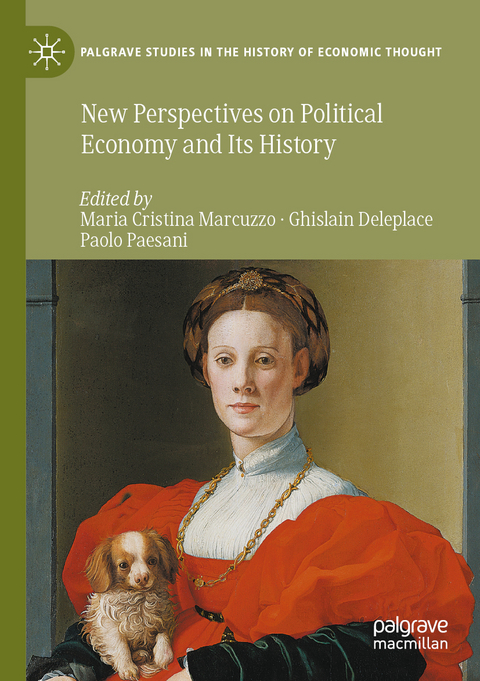
New Perspectives on Political Economy and Its History
Springer International Publishing (Verlag)
978-3-030-42927-0 (ISBN)
The book is split into five parts, opening with a section on new topics for the history of economic thought including new perspectives in gender studies and an illustration of the fecundity of the link with economic history. This is followed by sections that address relevant perspectives on the Classical approach to distribution and accumulation, Ricardo, interpretation of Sraffa and the legacy of Keynes.
This book will appeal to students interested in reforming economics, as well as academics and economists interested in political economy and thehistory of economic thought.
lt;p>
Maria Cristina Marcuzzo is Professor at the University of Rome 'La Sapienza', Italy, and Fellow of the Italian Academy of Lincei, Italy. She has published about 100 articles in journals and books, plus authoring or editing 20 volumes, among which Fighting market failure (2012), in Japanese by Nihon Keizai Hyoronsha (2015) and Essays in Keynesian Persuasion (2019).
Ghislain Deleplace is Emeritus Professor at the University Paris 8, France. He has published Private Money and Public Currencies (with M.T. Boyer-Xambeu and L. Gillard;1994), Money in Motion. The Post Keynesian and Circulation Approaches (co-edited with E.J. Nell; 1996), Ricardo on Money. A Reappraisal (2017), Histoire de la pensée économique (3rd edition 2018).
Paolo Paesani is Associate Professor at the University of Rome 'Tor Vergata', Italy. He has published articles in books and academic journals including History of Political Economy, Cambridge Journal of Economics, Journal of Post-Keynesian Economics. His research focuses on post-war monetary controversies, history of the Phillips curve and theory of speculation.
Chapter 1. Introduction.- Part 1. New Perspective for the History of Economic Thought.- Chapter 2. The methodological role of the history of economic thought.- Chapter 3. A bibliometric portrait of contemporary history of economic thought.- Chapter 4. Moving boundaries with gender budgeting: from the margins to the mainstream.- chapter 5. Family, gender equity and growth: history matters.- Chapter 6. Money banking and politics in early nineteenth-century Portugal.- Part 2.The Classical Perspective: Distribution of Income and Accumulation of Capital.- Chapter 7. Considerations on the development of Quesnay's Tableau Économiqu.- Chapter 8.Classical roots of the criticism to John Stuart Mill's wage fund theory.- Chapter 9. Classics today: Smith, Ricardo, Marx.- Part 3. David Ricardo: Money, Utilitarianism, and Influence .- Chapter 10. Bentham and Ricardo's rendez-vous manqués.- Chapter 11. How Ricardo came to Japan.- Chapter 12: From Ricardo to Sraffa: gold as monetary standard in a Classical theory of money.- Part 4. Interpreting Sraffa.- Chapter 13. Dialogues manqués between Antonio Gramsci and Piero Sraffa on Ricardo, classical political economy and 'pure economics'.- Chapter 14. Real and apparent unknowns and the origin of Sraffa's equations.- Chapter 15. What can still be learnt from Sraffa's theory of prices in a surplus-based economy?.- Part 5. The Legacy of Keynes: Liquidity, Method and Laissez-faire.- Chapter 16. Keynes, Schumpeter, Mercantilism and liquidity preference: some reflections on how we do history of economic thought.- Chapter 17. The original meaning of 'liquidity trap' in the early discussions between Robertson and Keynes.- Chapter 18. An outline of a Keynesian-Sraffian macroeconomics.- Chapter 19. The State and the market in John Maynard Keynes and his relevance today.
"The contributions collected in this volume, too, testify of the interest and fecundity of this approach: not just historical-analytical in methodological terms, but specifically interested in understanding what treasures the past could still provide today - understanding the limits of current theoretical fads, and providing inspiration for new and alternative ideas." (Carlo D'Ippoliti, economia & lavoro, Vol. 56 (2), 2022)
“The contributions collected in this volume, too, testify of the interest and fecundity of this approach: not just historical-analytical in methodological terms, but specifically interested in understanding what treasures the past could still provide today — understanding the limits of current theoretical fads, and providing inspiration for new and alternative ideas.” (Carlo D’Ippoliti, economia & lavoro, Vol. 56 (2), 2022)
| Erscheinungsdatum | 15.05.2021 |
|---|---|
| Reihe/Serie | Palgrave Studies in the History of Economic Thought |
| Zusatzinfo | XVIII, 406 p. 10 illus., 3 illus. in color. |
| Verlagsort | Cham |
| Sprache | englisch |
| Maße | 148 x 210 mm |
| Gewicht | 552 g |
| Themenwelt | Geschichte ► Teilgebiete der Geschichte ► Wirtschaftsgeschichte |
| Geisteswissenschaften ► Philosophie ► Erkenntnistheorie / Wissenschaftstheorie | |
| Wirtschaft ► Volkswirtschaftslehre ► Wirtschaftspolitik | |
| Schlagworte | Annalisa Rosselli • Bibliometric indicators in economics • classical political economy • Economic and social systems • feminist economics • Free Market • Gender Budgeting • Keynes • liquidity • Ricardo • sraffa |
| ISBN-10 | 3-030-42927-X / 303042927X |
| ISBN-13 | 978-3-030-42927-0 / 9783030429270 |
| Zustand | Neuware |
| Haben Sie eine Frage zum Produkt? |
aus dem Bereich


